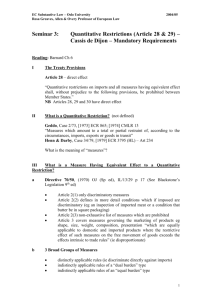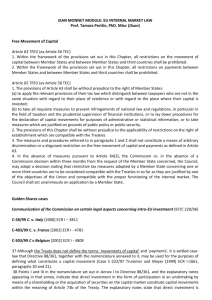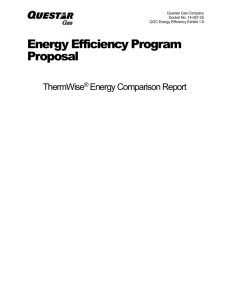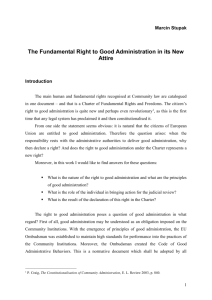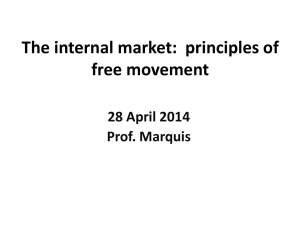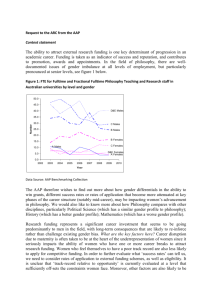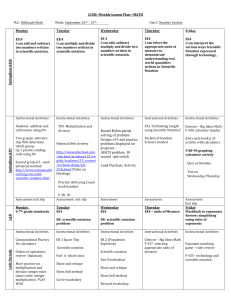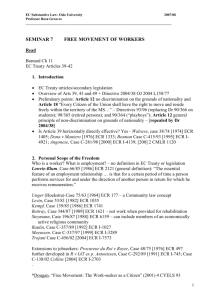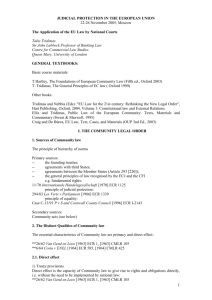Seminar 3:
advertisement
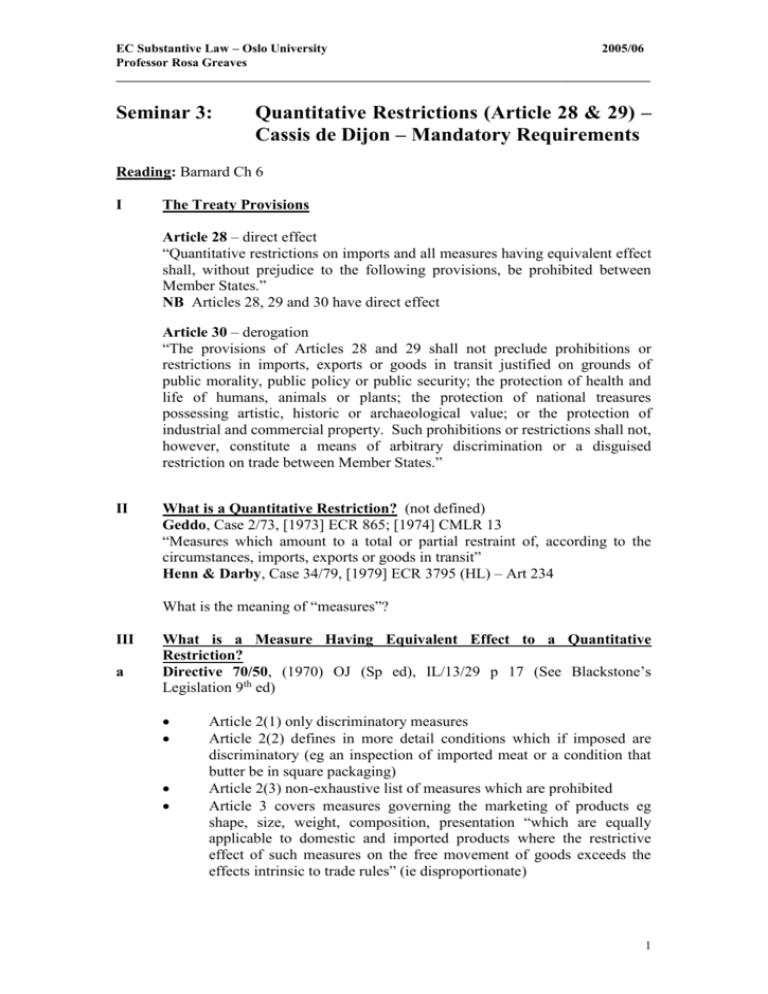
EC Substantive Law – Oslo University 2005/06 Professor Rosa Greaves ___________________________________________________________________________________ Seminar 3: Quantitative Restrictions (Article 28 & 29) – Cassis de Dijon – Mandatory Requirements Reading: Barnard Ch 6 I The Treaty Provisions Article 28 – direct effect “Quantitative restrictions on imports and all measures having equivalent effect shall, without prejudice to the following provisions, be prohibited between Member States.” NB Articles 28, 29 and 30 have direct effect Article 30 – derogation “The provisions of Articles 28 and 29 shall not preclude prohibitions or restrictions in imports, exports or goods in transit justified on grounds of public morality, public policy or public security; the protection of health and life of humans, animals or plants; the protection of national treasures possessing artistic, historic or archaeological value; or the protection of industrial and commercial property. Such prohibitions or restrictions shall not, however, constitute a means of arbitrary discrimination or a disguised restriction on trade between Member States.” II What is a Quantitative Restriction? (not defined) Geddo, Case 2/73, [1973] ECR 865; [1974] CMLR 13 “Measures which amount to a total or partial restraint of, according to the circumstances, imports, exports or goods in transit” Henn & Darby, Case 34/79, [1979] ECR 3795 (HL) – Art 234 What is the meaning of “measures”? III a What is a Measure Having Equivalent Effect to a Quantitative Restriction? Directive 70/50, (1970) OJ (Sp ed), IL/13/29 p 17 (See Blackstone’s Legislation 9th ed) Article 2(1) only discriminatory measures Article 2(2) defines in more detail conditions which if imposed are discriminatory (eg an inspection of imported meat or a condition that butter be in square packaging) Article 2(3) non-exhaustive list of measures which are prohibited Article 3 covers measures governing the marketing of products eg shape, size, weight, composition, presentation “which are equally applicable to domestic and imported products where the restrictive effect of such measures on the free movement of goods exceeds the effects intrinsic to trade rules” (ie disproportionate) 1 EC Substantive Law – Oslo University 2005/06 Professor Rosa Greaves ___________________________________________________________________________________ b 3 Broad Groups of Measures c distinctly applicable rules (ie discriminate directly against imports) indistinctly applicable rules of a “dual burden” type indistinctly applicable rules of an “equal burden” type The Dassonville Formula Dassonville, Case 8/74, [1974] ECR 837; [1974 2 CMLR 436 “All trading rules enacted by Member States which are capable of hindering directly or indirectly, actually or potentially, intra-Community trade are to be considered as measures having equivalent effect to quantitative restrictions” (intention irrelevant) The Dassonville Formula, Case 8/74, [1974] ECR 837; [1974] CMLR 436 Facts: Criminal proceedings in Belgium were brought against a trader who acquired a consignment of Scotch whisky in free circulation in France, and imported it into Belgium without being in possession of a certificate of origin from the UK customs authorities. This was in violation of the Belgian customs requirements, the UK at the time not being part of the customs union. Dassonville prepared its own certificate of origin and was prosecuted for forgery d “All Trade Rules Enacted by Member States” Article 28 to 30 are concerned with state measures and include measures taken by a professional body which lays down the rules of ethics applicable; a company limited by guarantee charged with the task of organising a “buy national” campaign – no need for them to be binding No de minimis rule even though sterongly argued for by various Advocates General Commission v Ireland, Case 249/81, [1982] ECR 4005; [1983] 2 CMLR 104 Apple and Pear Development Council v Lewis, Case 222/82, [1983] ECR 4083 R v Royal Pharmaceutical Society, Case 266/87, [1989] ECR 1295; [1989] 2 CMLR 751 Commission v France Case C-265/95 [1997] ECR I-6959 e Types of Measures Import bans: Commission v UK (French Turkeys), Case 40/82, [1982] ECR 2793; [1982] 3 CMLR 497 Buy national campaigns: Commission v Ireland (Buy Irish), Case 249/81, [1982] ECR 4005; [1983] 2 CMLR 104 Inspections or checks – Case 35/76 Simmenthal [1976] ECR 1871; [1977] 2 CMLR 1 2 EC Substantive Law – Oslo University 2005/06 Professor Rosa Greaves ___________________________________________________________________________________ IV Price regulation (maximum and minimum prices) Standards (technical specifications): Commission v Ireland (Dundalk Water Scheme), Case 45/87, [1988] ECR 4929 Origin markings: Commission v UK, Case 207/83 [1985] ECR 1201 Cassis de Dijon, Case 120/78, [1979] ECR 649; [1979] CMLR 494 Cassis de Dijon, Case 120/78, [1979] ECR 649; [1979] CMLR 494 Facts: German law prohibited the marketing of liqueurs with an alcoholic strength of less than 25°. This made it impossible for the plaintiff to import a consignment of Cassis de Dijon, a French liqueur with a strength of between 15 and 25°, into Germany. The liqueur therefore could not compete with the stronger German one. No restrictions on the production and marketing of the weaker liqueur existed in France. Commission Communication on the consequences of Cassis de Dijon, [1980] OJ C256/2 (see Blackstone’s Legislation) [See also Gormley “Cassis de Dijon & the Communication from the Commission” (1981) 16 ELRev 454] ECJ – no valid reason why provided a product is lawfully marketed in one Member State it should not be introduced into any other Member State – mutual recognition approach V Mandatory Requirements One exemption to the mutual recognition principle where the disparities result from national provisions which are recognised as being necessary in order to satisfy certain “mandatory requirements” (rule of reason) Non-exhaustive list (contrast with Article 30 derogations) protection of public health effectiveness of fiscal supervision fairness of commercial transactions defence of the consumer Commission v Germany (Beer purity laws), Case 178/84, [1987] ECR 1227; [1988] 1 CMLR 780 (consumer protection) Additions Environment protection: Commission v Denmark, Case 302/86, [1988] ECR 4607; [1989], 1 CMLR 619 Cultural protection: Cinetheque, Joined Cases 60 & 61/84, [1985] ECR 2605; [1986] 1 CMLR 365 Improving working conditions: Oebel, Case 155/80, [1981] ECR 1993 NB Member States free to apply higher standards for domestic goods marketed at home. 3
